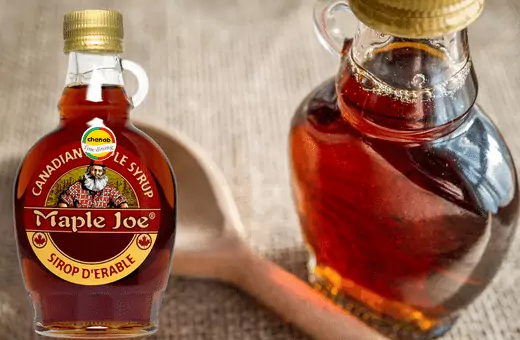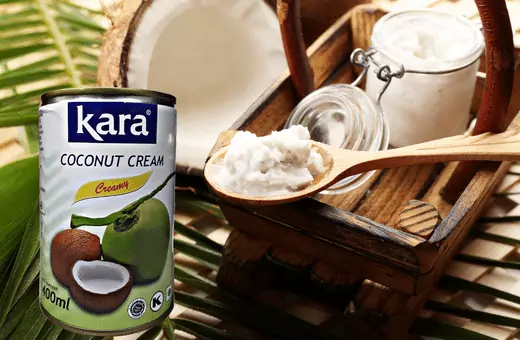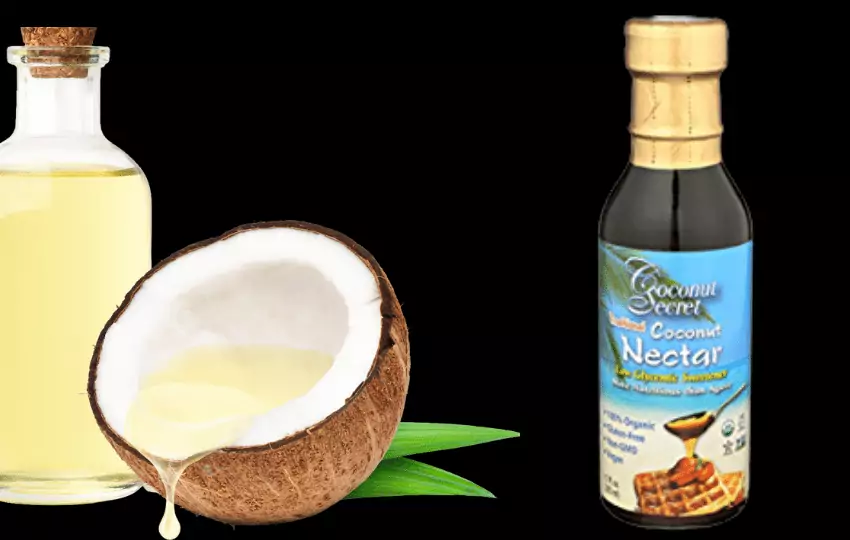While coconut nectar is a delicious sweetener, it’s not always easy to find. And If you’re anything like me, then you probably love coconut nectar. But what do you do when you don’t have any on hand and need a quick coconut nectar substitution?
Well, there are several options to consider that will give your dish the same flavor profile. Like Raw honey, maple syrup, and agave nectar are all good coconut nectar substitutes.
In some cases, you can also use regular sugar or brown sugar. Whichever substitution you choose, make sure to adjust the amount accordingly because they each have different levels of sweetness.
With a little experimentation, you’ll be able to create dishes that taste just like you imagined them with coconut nectar!
So read on and get ready to cook up something delicious!
What is Coconut Nectar?
Coconut nectar is a sweetener made from the sap of coconut trees. It has a rich, caramel-like flavor and can be used in place of sugar in many recipes. Coconut nectar is also a good source of vitamins and minerals, and it contains amino acids that can help boost energy levels.
Coconut nectar uses
Coconut nectar has a variety of uses. It can be used to sweeten beverages, baked goods, and sauces. It can also be used as a sugar substitute in baking or cooking.
If you are looking for new ways to add coconut nectar to your diet, try using it in smoothies or as a sweetener in baked goods or desserts. You can also use coconut nectar to make a variety of sauces or glazes, such as coconut-glazed salmon or chicken.
Here are some delicious recipes that feature coconut nectar:
Coconut-Glazed Salmon: This recipe uses coconut nectar to create a sweet and savory glaze for salmon. The salmon is first baked in the oven, then brushed with the coconut nectar glaze and broiled until it starts to caramelize.
Coconut-Chia Seed Pudding: This pudding recipe uses coconut nectar as a sweetener and is topped with fresh berries and chopped nuts. The chia seeds help thicken the pudding, giving it a rich, creamy texture.
Coconut-Mango Barbecue Sauce: This recipe uses coconut nectar as a base for a tangy and sweet barbecue sauce. The sauce is ideal for chicken or pork, and it can also be used in sandwiches or wraps.
As you can see, there are many ways to use coconut nectar in your diet. Whether you are looking for new ways to sweeten your food or you want to boost your energy levels, coconut nectar can be a great addition to your diet. Give it a try in one of these recipes, or use it to create your own!
What can You use instead of Coconut nectar?
For a quick answer, you can use any natural sugar like coconut sugar, agave, maple syrup, honey, monk fruit, brown rice syrup, molasses, date syrup, and coconut cream. You can also try the easy homemade recipe for coconut nectar.
Coconut Nectar substitutes
1. COCONUT SUGAR- Best substitute for coconut nectar
Coconut sugar is a natural sweetener that comes from the sap of coconut flowers. It has a mild caramel-like taste and can be used in place of regular sugar in most recipes.
Coconut sugar can be used in baking and cooking or added to coffee or tea for a delicious sweetness.
Use coconut sugar as a 1:1 replacement for coconut nectar, cane sugar, or brown sugar in most recipes. You can also use it to sweeten coffee or tea.
Coconut sugar is made from the sap of the flower buds of the coconut palm tree. The sap is then boiled and evaporated to create crystals or granules. The process of making coconut sugar is similar to the way cane sugar, and maple sugar is made.
2. MAPLE SYRUP – A Good Alternative to Coconut Nectar
Substitute maple syrup for coconut nectar to make a delicious and healthy alternative to sugary beverages. Adding maple syrup to your coconut water will help replenish lost electrolytes and keep you hydrated during intense physical activity.

The taste of maple syrup is caramel-like. It can be used in all sorts of recipes, both sweet and savory. It’s a delicious ingredient for pancakes, waffles, and French toast. You can also use maple syrup as a topping for yogurt or granola or mix it into smoothies or baked goods.
If you’re looking for a delicious way to enjoy coconut water, try adding maple syrup to it. The combination of sweetness and electrolytes will help keep you hydrated and energized during your workout. Just be sure to consume in moderation, as maple syrup is still a high-sugar food.
3. Use raw Honey instead of Coconut Nectar
Raw Honey is a great substitute for coconut nectar sweeteners because it is naturally sweeter than most other options. This means that you can use less honey than you would from other sweeteners and still achieve the desired level of sweetness.
Whether you are baking pies or cooking up something savory on the stovetop, there are many delicious ways to use raw honey in place of other natural sweeteners.
One option when substituting honey for coconut nectar or maple syrup is to start by using a 1:1 ratio. This means that you can use the same amount of raw honey as you would coconut nectar or maple syrup in your recipe.
Depending on the nature of your dish and how sweet it needs to be, you may need to adjust the quantity of honey used slightly until you find a balance that works for your preferences.
Keep in mind that raw honey is more viscous than coconut nectar sweeteners, so it can affect the overall texture of your dish. If you are concerned about this, simply add a little bit more liquid to your recipe to compensate.
4. Luohan Guo- coconut blossom nectar substitute
Luohan Guo a.k.a Monk fruit, is a small gourd-like fruit that grows on small trees in tropical climates. Monks from Asia have been using the sweet nectar of this ancient fruit for centuries as they believe it has many health benefits and medicinal properties.
Monk fruit tastes similar to sugar but has very few calories and none of the negative effects associated with sugar. This makes it an excellent substitute for coconut nectar in recipes, as well as for sweetening drinks.
There are many uses for monk fruit in recipes. You can use it as a sugar substitute in baking or add it to smoothies or other drinks for a naturally sweet taste. Monk fruit can also be used as a topping on healthy desserts or eaten on its own as a sweet snack.
Be sure to store monk fruit extract in a cool, dark place and use it within 6 months of opening.
5. Substitute AGAVE for Coconut Nectar
Agave nectar is a natural sweetener that is derived from the agave plant. It has a milder, more neutral flavor than other types of sugar, making it ideal for use in various recipes.
Agave nectar can be used as a substitute for any sugar like coconut nectar in baking or cooking or added to beverages for sweetness. It is also a popular ingredient in many health food products, such as energy bars and protein shakes.
When substituting agave nectar for coconut nectar, use the same amount as recommended in the recipe. However, when baking with agave nectar, you may need to reduce the temperature by about 25 degrees Fahrenheit since it is a liquid sweetener and not granulated sugar.
If you are looking for agave nectar, there are a number of places where you can buy it online or in stores. (from amazon)
6. Brown Rice Syrup- Suitable Replacement for Coconut Nectar
Another excellent coconut nectar substitute is brown rice syrup. It is also a natural sweetener made from brown rice. It has a mild flavor, which makes it ideal for use in baking and other recipes. This healthy alternative to sugar can also be used in place of processed sugars or artificial sweeteners.
One thing to keep in mind when using brown rice syrup is that it does not dissolve as easily as sugar, so it may not be suitable for all recipes.
Use it as a 1:1 replacement for coconut nectar in any recipe. It has a similar flavor profile and sweetness, making it perfect for baked goods, smoothies, and more.
Plus, it’s vegan and gluten-free! Whether you’re looking for a healthier sweetener or just trying to avoid coconut, brown rice syrup is sure to become one of your go-to ingredients.
7. Molasses- Acceptable substitution for Coconut Nectar
You can replace coconut nectar with molasses in recipes. It has a similar sweetness and is used in equal amounts. However, molasses is a thicker, dark, sticky syrup, so you may need to adjust the amount of liquid in the recipe accordingly.
It has a slightly bitter taste and is often used in baking or as a sweetener in recipes.
Molasses has a number of different uses, both in cooking and as a natural remedy. It is often used to sweeten baked goods or make them moister, and it can be added to smoothies, sauces, gravies, and other dishes for extra flavor.
Additionally, molasses has a strong flavor that can change the taste of the finished dish, so it’s important to carefully taste and adjust the recipe as needed.
Overall, molasses is a valuable alternative for people who want to reduce their intake of coconut nectar without sacrificing flavor.
8. Try Date Syrup instead of Coconut nectar
Date syrup is made from the sap of an orangutan tree. To make the syrup, the sap is boiled and then concentrated to form a thick syrup.
Date syrup is used as a sweetener in many foods and beverages, such as desserts, candies, and coffee. In addition to being naturally sweet, date syrup also contains many vitamins and minerals that are beneficial for health.
To substitute date syrup for coconut nectar in this recipe, simply swap out the two ingredients in a one-to-one ratio. So, if the recipe calls for 1/4 cup of coconut nectar, use 1/4 cup of date syrup instead.
· This substitution will work in most recipes, though you may want to experiment with the ratio a bit depending on the sweetness level you’re going for. Date syrup is a bit thinner than coconut nectar, so keep that in mind when making substitutions.
9. COCONUT CREAM
Although this one is not a good substitute for coconut nectar, still can use as a substitution.
Coconut cream is a versatile ingredient that can be used in a variety of recipes. It’s perfect for baking, making frostings and fillings, or simply enjoying it as is.

Coconut cream is rich and light, with a mellow sweetness and hint of coconut flavor. It’s perfect for those who want to enjoy the taste of coconut without the heaviness of traditional coconut milk.
When you’re in the mood for something sweet, but don’t want to use refined sugar, coconut nectar is a great alternative. It’s made from the sap of coconuts and has a delicate sweetness that can be used in all sorts of recipes.
How do you make coconut nectar at home?
Coconut nectar can be prepared at home by following a few simple steps.
The first step is –
To extract the coconut milk from fresh coconuts by grating them and boiling the milky liquid over low heat for about 20 minutes. Strain out the solids that settled in the bottom of your pot, then add brown sugar and water to the coconut milk in a 1:1 ratio.
2nd step-
Boil this mixture over low heat until the sugar has completely dissolved, then allow it to cool completely. Once cooled, transfer the nectar to a clean bottle or jar and store it in the fridge for up to 2 weeks.
Enjoy your homemade coconut nectar in smoothies on top of oatmeal or pancakes, or simply add it to water or tea for a refreshingly sweet drink.
Read More- Best Substitutes for Sucanat
FAQs Related to Coconut Nectar and its Alternatives
Q1. Is coconut nectar the same as coconut syrup?
Yes, they are the same thing. Coconut nectar is simply the raw, unrefined sap of the coconut tree, while coconut syrup is a processed, refined version of this sap. Both products can be used in sweet and savory dishes to add a touch of sweetness and flavor.
Q2. Does coconut sugar taste like coconut?
It really depends on the brand of coconut sugar you purchase. Some brands have a stronger coconut flavor than others. However, generally speaking, coconut sugar does have a slightly coconutty taste to it. If you’re looking for a sweeter alternative to traditional cane sugar, then coconut sugar is definitely worth trying!
Overall, coconut sugar is a great alternative to cane sugar that tastes delicious and can be used in a variety of different ways. If you’re looking for a sweetener with natural health benefits, then give coconut sugar a try! You won’t be disappointed.
Q3. Is coconut nectar better than sugar?
As it depends on a number of factors. Coconut nectar does have some potential benefits over sugar, but it also has some drawbacks.
Some of the potential benefits of coconut nectar include its ability to provide a natural source of sweetness and energy, as well as its moderate glycemic index. Coconut nectar is also rich in key nutrients like vitamins, minerals, and amino acids.
However, coconut nectar does contain a significant amount of sugar and calories, which can be problematic for people trying to limit their sugar intake. It can also be difficult to find coconut nectar in many grocery stores, making it less convenient than sugar.
Ultimately, the decision of whether or not to use coconut nectar over sugar depends on your dietary and health goals, as well as personal taste preferences. Some people may prefer to use coconut nectar for its potential benefits, while others may find it easier to stick with sugar.
Ultimately, the best sweetener is the one that works best for you.
Q4. Is coconut nectar the same as sugar?
No, coconut nectar is not the same as sugar. Coconut nectar is a natural sweetener made from the sap of the coconut tree. Sugar is made from refined or unrefined sugan cane.
Q5. Is coconut nectar better than maple syrup?
There are many factors to consider when deciding whether one sweetener is better than another.
Coconut nectar and maple syrup both have unique flavor profiles that can enhance certain dishes.
However, coconut nectar is lower on the glycemic index than maple syrup, meaning it won’t cause as big of a spike in blood sugar levels. Coconut nectar also contains lower levels of fructose, a type of sugar commonly found in fruit. Depending on what you’re using your sweetener for, either one may be the better choice for you.
Overall, whether one sweetener is better than another depends largely on individual preferences and dietary needs.
Some people prefer coconut nectar because it has a more subtle flavor than maple syrup, while others prefer the rich and caramel-y taste of pure maple syrup.
Ultimately, it’s important to evaluate the different options available and choose what works best for your diet and palate.
q6. Can I use coconut sugar instead of coconut nectar?
You can use coconut sugar instead of coconut nectar, but the flavor will be slightly different. Coconut sugar is less sweet than coconut nectar, so you may want to add a little extra to your recipe.
Q7. Does coconut nectar expire?
Coconut nectar does not have an expiration date per se, but it will eventually dry out and become hard if it is not stored properly. To extend the shelf life of your coconut nectar, be sure to keep it in a cool, dark place and tightly sealed when not in use.

